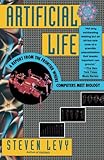Some people say that reading Richard Dawkins caused them to become atheist. For me, it was very clearly "Artificial Life" and the code I wrote playing around w/ "evolving" Corewars code.
I managed to eek out a little "evolution" in my experimentation. I was never particularly religious to begin with. My simulation code caused me to deeply consider the power of evolution. Here was this tiny change, evolved from randomness in a minuscule virtual "petri dish", out of a tiny amount of ingredients that were brittle and unforgiving of the slightest change, on a time scale that was the smallest fraction of a fraction of the age of the universe.
Observing the sheer magnitude of the chemical "parallel computing substrate" at the scale of atoms and molecules, interacting in real time, across a space as large as the Earth, in a timescale measuring billions of years, and over a wide variety of temperature and energy gradients made me aside any concerns that all life couldn't have arisen from randomness.
I didn't need an "intelligent designer" after that. Nature, the vastness of space, the minuteness of atoms, and the overwhelming scale of time were enough.
[1] https://www.amazon.com/Artificial-Life-Frontier-Computers-Bi...
[2] https://en.wikipedia.org/wiki/Tierra_(computer_simulation)
Wolfram's work with cellular automata is definitely interesting, and I really "A New Kind of Science". (Edit: I must also concede that I agree with the review "A Rare Blend of Monster Raving Egomania and Utter Batshit Insanity" cited by another comment here. Wolfram is a good read and a lot of fun, but I question the "science" in the book.)
I haven't re-read it recently to see how it holds up, but Steven Levy's "Artificial Life" (https://www.amazon.com/Artificial-Life-Frontier-Computers-Bi...) hooked me as a kid and set a direction for my future thought. It's not a technical book (which was frustrating to a 14 y/o kid with a programming background that wanted to see the technical details), but I think it would be very thought-provoking for someone new to the idea.
http://www.amazon.com/Artificial-Life-Frontier-Computers-Bio...
It's slightly dated, but I thought it was a really good introduction.
I sometimes think we fail to pay enough credit to the early pioneers of the computing field. I was recently reading the "Artificial Life" book by Levy[1], and it starts off with a lot of history about Von Neumann, Turing, and a host of other characters. Fascinating stuff, and that definitely has nudged me to try and make some time to do more reading about the "early days" of computing.
[1]: http://www.amazon.com/Artificial-Life-Frontier-Computers-Bio...


At the time I learned about Tierra I didn't have a way to get at any of Ray's papers or code. Now I do, but I'd kinda forgotten about it. I really should revisit it. There's probably a lot of fun to be had there.
Aside: Steven Levy's "Artificial Life"[1] was where I learned about Tierra. That book, along with Levy's "Hackers"[2], and Gleick's "Chaos"[3] were formative books for young me.
[0] https://en.wikipedia.org/wiki/Core_War
[1] https://www.amazon.com/Artificial-Life-Frontier-Computers-Bi...
[2] https://www.amazon.com/Hackers-Computer-Revolution-Steven-Le...
[3] https://www.amazon.com/Chaos-Making-Science-James-Gleick/dp/...